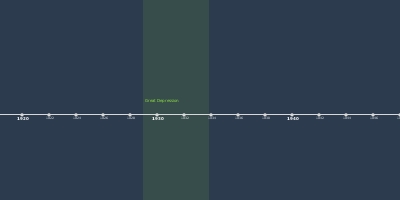The Great Proletarian Cultural Revolution (may 1, 1966 – sep 9, 1976)
Description:
- A social and political movement to:- Officially, revive the "constant revolution" called for by Marxism and eliminate capitalistic elements and forces in China (as opposed to what was happening in Russia with détente)
- Politically, to eliminate Mao's rivals (Liu Shaoqi (president) and Deng Xiaoping) in government
- Internationally, to make up for the failure of the Great leap Forward
- Culturally, to reshape China's culture so that the state could remain strong after Mao dies
- The "Four Olds" (four characteristics of old China) were targeted and attacked. Old:
- Ideas
- Culture
- Customs
- Habits
- This resulted in the destruction of books, buildings, artifacts and objects from pre-revolutionary China
- Intellectuals and religion were also targeted as they had the capability of influencing peoples beliefs
- The Red Guard was the main revolutionary body of the Cultural Revolution, consisting of students and young people
- Enforced Mao's will and denounced the Four olds (using sometimes violent means, e.g. struggle sessions)
- Later there formed rivalry between the groups
- Red Guard was supplied with names and addresses of people in the five categories:
- Landlords
- Rich peasants
- Reactionaries
- Bad elements
- Rightists
to carry out correction. These were not limited to Chinese nationals (attacks on embassies also occurred)
- The Red Guard also engaged in the destruction of old Chinese historical pieces such as buildings, books, art, etc.
- The Gang of Four was a central group in the implementation of the Cultural Revolution. A hard-line group consisting of Jiang Quing (Mao's wife), Zhang Chunqiao, Yao Wenyuan, and Wang Hongwen
- The Central Cultural Revolution Group (CCRG, formed in 1966) was in charge of directing the cultural revolution (the Gang of Four were all members)
- The August rally was the first big event of the cultural revolution
- Around one million citizens gathered in Tiananmen square and sang Mao praise
- There were several other rallies (8) throughout August to November
- Liu Shaoqi and Deng Xiaoping both denounced shortly after the Cultural Revolution's start
- Lin Biao, Jiang Quing, and Kang Sheng (head of China's special security forces and member of Shanghai Forum (organises Mao's purges)) gain influence
1972-76
- The severity and extremism of the Cultural Revolution lessens
- This is due to the questioning of state decisions, wish to impress the US (from Nixon's visit), criticism to policy severity, etc.
- Zhou Enlai and Deng Xiaoping reenter party favour and gain influence
Added to timeline:
Date:
may 1, 1966
sep 9, 1976
~ 10 years
